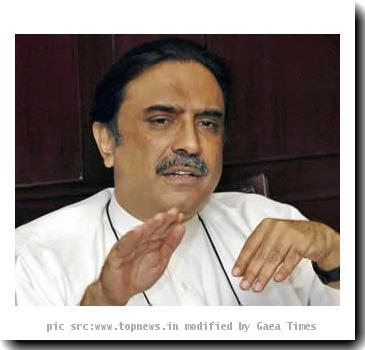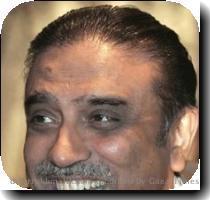UN investigators blame inadequate security for Benazir Bhutto’s assassination
By Edith M. Lederer, APThursday, April 15, 2010
Investigators blame bad security for Bhutto death
UNITED NATIONS — A U.N. commission on Thursday said the assassination of Pakistan’s former prime minister, Benazir Bhutto, could have been prevented and blamed all levels of government for failing to provide adequate security. It also accused intelligence agencies and other officials of severely hampering the investigation into those behind her murder.
Bhutto was killed in a Dec. 27, 2007, gun and suicide-bomb attack as she was leaving a rally in the garrison town of Rawalpindi, where she was campaigning to return her Pakistan People’s Party to power in parliamentary elections. There had previously been an attempt on her life when she returned to Pakistan 10 weeks earlier on Oct. 18, 2007 after 8 1/2 years in self-imposed exile.
The panel said her death could have been prevented if the government under then-President Pervez Musharraf, the Punjab state government, and the Rawalpindi District Police had taken adequate measures “to respond to the extraordinary, fresh and urgent security risks that they knew she faced.”
“Ms. Bhutto’s assassination could have been prevented if adequate security measures had been taken,” the commission said.
It also found that the investigation into her death was severely hampered by intelligence agencies and other government officials, “which impeded an unfettered search for the truth.”
Chile’s U.N. Ambassador Heraldo Munoz, who chaired the three-member commission, told a news conference that “we don’t make a judgment” on whether the failure to provide adequate security was deliberate.
Musharraf’s government blamed Baitullah Mehsud, a Pakistani militant commander with reported links to al-Qaida. Officials at the U.S. Central Intelligence Agency also said Mehsud was the chief suspect.
But Bhutto’s party repeatedly hinted that Musharraf or his allies were involved and demanded a U.N. probe, claiming it was the only way the whole truth would be revealed.
Faranaz Ispahani, spokeswoman for President Asif Ali Zardari, Bhutto’s husband, said: “The U.N. commission has meticulously identified the criminal attitude of the previous dictatorial regime that led to Mohtarma Benazir Bhutto’s death.”
“The report will pave the way for a proper police investigation and possible penal proceedings,” she told the Associated Press in Islamabad.
The commission said Musharraf’s government, though fully aware and tracking threats against Bhutto, did little more than pass them on to her and to provincial authorities and did not take action to neutralize them or ensure “that the security provided was commensurate with the threats.”
Bhutto’s party provided additional security, but the arrangements “lacked leadership and were inadequate and poorly executed,” it said.
“The Rawalpindi District Police’s actions and omissions in the immediate aftermath of the assassination of Ms. Bhutto, including the hosing down of the crime scene and failure to collect and preserve evidence, inflicted irreparable damage to the investigation,” the commission said. The decision to not conduct an autopsy made it impossible to determine a precise cause of death, it said.
It said the investigation “lacked direction, was ineffective and suffered from a lack of commitment to identify and bring all of the perpetrators to justice.”
While Bhutto was killed by a 15 1/2-year-old suicide bomber, “no one believes that this boy acted alone,” it said.
“Ms. Bhutto faced threats from a number of sources,” the commission said. “These included al-Qaida, the Taliban, local jihadi groups and potentially from elements in the Pakistani establishment.”
But it said the investigation focused on pursuing “lower level operatives,” not those further up the hierarchy.
The commission said Pakistan’s powerful Inter-Services Intelligence conducted parallel investigations, gathering evidence which was only selectively shared with the police.
“The commission believes that the failure of the police to investigate effectively Ms. Bhutto’s assassination was deliberate,” the report said. “These officials, in part fearing intelligence agencies’ involvement, were unsure of how vigorously they ought to pursue actions, which they knew, as professionals, they should have taken.”
The commission urged Pakistani authorities to carry out a “serious, credible” criminal investigation that “determines who conceived, ordered and executed this heinous crime of historic proportions, and brings those responsible to justice.”
“Doing so would constitute a major step toward ending impunity for political crimes in this country,” it said.
To address the broader issue of impunity for political crimes, the commission called for Pakistan to consider establishing a “fully independent Truth and Reconciliation Commission to investigate political killings, disappearances and terrorism in recent years” and provide victims with “material and moral reparations.”
The commission said “the autonomy, pervasive reach and clandestine role of intelligence agencies in Pakistani life underlie many of the problems, omissions and commissions set out in this report.”
It urged the government to conduct a thorough review of intelligence agencies “based on international best practices” and reform the police to ensure “democratic policing” and protection of individual human rights.
The report was originally scheduled to be presented on March 30 but Zardari asked Secretary-General Ban Ki-moon to delay the release and he agreed.
Pakistan’s presidential spokesman, Farhatullah Babar, said the country asked for the delay so the commission could attempt to question two heads of state who he said had called Bhutto before her death warning her of “serious threats to her life.” The commission responded saying its probe had been completed.
The secretary-general agreed to appoint a commission to assist Pakistan by determining the facts and circumstances of Bhutto’s death and it began work on July 1, 2009.
Under terms agreed to by the U.N. and the Pakistani government, Pakistani authorities would determine any criminal responsibility.
The other members of the commission were former Indonesian attorney general Marzuki Darusman, now a member of the National Commission of Human Rights, and Ireland’s former deputy police commissioner Peter Fitzgerald, who headed the initial U.N. mission of inquiry into the assassination of former Lebanese Prime Minister Rafik Hariri in 2005.
Munoz, a dissident who was imprisoned during the dictatorship of Gen. Augusto Pinochet, said the commission received “significant support” from the Pakistani government and many of its citizens. It conducted more than 250 interviews and reviewed hundreds of documents, videos, photographs and documentary material, he said.
The secretary-general set up a special trust fund to pay for the commission’s work and asked for voluntary contributions. U.N. associate spokesman Farhan Haq said Wednesday that the Pakistani government was the major contributor.
Associated Press Writer Chris Brummitt contributed to this report from Islamabad, Pakistan
Tags: Asia, Asif Ali Zardari, Criminal Investigations, Intelligence Agencies, Islamabad, Pakistan, South Asia, United Nations, Violent Crime


